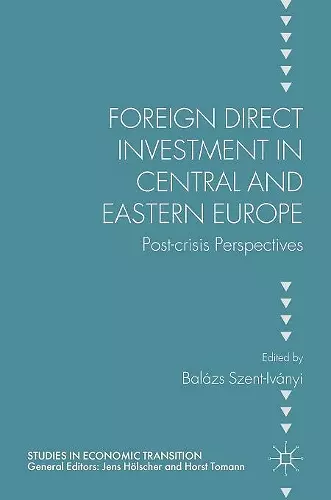Foreign Direct Investment in Central and Eastern Europe
Post-crisis Perspectives
Format:Hardback
Publisher:Springer International Publishing AG
Published:4th Jan '17
Currently unavailable, and unfortunately no date known when it will be back

"This excellent volume is a well-structured and timely contribution to the literature on foreign direct investment and the post-socialist economies of Central and Eastern Europe. It contributes valuable evidence to support the growing calls to reconsider how FDI and development interact in an interdependent and globalized world. FDI policies need to be more dynamic, and evolve with changing internal and external circumstances." (Rajneesh Narula, The John H. Dunning Chair in International Business, Professor of International Business and Strategy, Henley Business School, UK) "The book presents an even-handed view of foreign direct investment (FDI), stressing its positive effects, but also pointing out that attracting FDI should not be seen as a substitute for a vibrant domestic business sector, otherwise dual economic structures emerge, and development becomes unbalanced. It is the aftermath of the global financial crisis that exposed both the risks and the benefits of FDI, and the book does a good job documenting it. It identifies both how FDI-related financial flows changed after the crisis, what was the strategy response of local affiliates, and where foreign ownership played a stabilising role post-crisis, in the banking sector in particular. Importantly, the book also accounts for the recent trend towards the adoption of "national capitalist" policies and identifies the associated risks of the focus on picking the winners instead of creating an environment for national champions to emerge. Ironically, these policies may replace imbalances related to the role of foreign firms with even more serious imbalances created by the focus on state-sponsored entrenched local players. Given the current political trends in Europe and elsewhere, the Central European lessons that are so well documented in this book acquire wider importance." (Tomasz Mickiewicz, 50th Anniversary Professor in Economics, Aston University, Birmingham, UK) "This collective volume takes a fresh look at the role of FDI in globalizing and upgrading the economies of East-Central Europe, the new EU members. Offering critical theoretical perspectives, the authors provide a policy relevant analysis of the post-crisis period. While generally supportive of FDI-led modernization, they also call attention to the dangers of being caught in a low value capture trap, which may be exacerbated if industrial policies are statist and arbitrary. A must read for anyone seriously interested in new trends in foreign direct investment, in academia and policy-making alike." (Laszlo Csaba, Member of the Hungarian Academy of Sciences and of Academia Europaea, London, UK)
This book examines how foreign direct investment (FDI) inflows to Central and Eastern Europe have changed after the Great Recession.This book examines how foreign direct investment (FDI) inflows to Central and Eastern Europe have changed after the Great Recession. It argues that beyond their cyclical effects, the economic crisis and the changing competitiveness of Central and Eastern European countries have had structural impacts on FDI in the region. FDI has traditionally been viewed as the key driver of national development, but the apparent structural shift means that focusing on cheap labour as a competitive advantage is no longer a viable strategy for the countries in the region. The authors argue that these countries need to move beyond the narrative of upgrading (attracting FDI inflows with increasingly higher value added), and focus on ensuring greater value capture instead. A potential way for doing this is by developing the conditions in which innovative national companies can emerge, thrive and eventually develop into lead firms of global value chains. The book provides readers with a highly informative account of the reasons why this shift is necessary, as well as diverse perspectives and extensive discussions on the dynamics and structural impacts of FDI in post-crisis Central and Eastern Europe.
“This book sets out to describe and analyse the main developments in foreign direct investment (FDI), in terms of volume and structure … . For readers interested in CEE and the EU, this book can also provide valuable insights. The new trends it documents and analyses have not been reflected so far in appropriate policy responses. In this respect the volume provides policymakers with practical evidence and policy suggestions they would do well to consider and act upon.” (Liliana Pop, Europe-Asia Studies, Vol. 70 (7), 2018)
ISBN: 9783319404950
Dimensions: unknown
Weight: 4703g
266 pages
1st ed. 2017